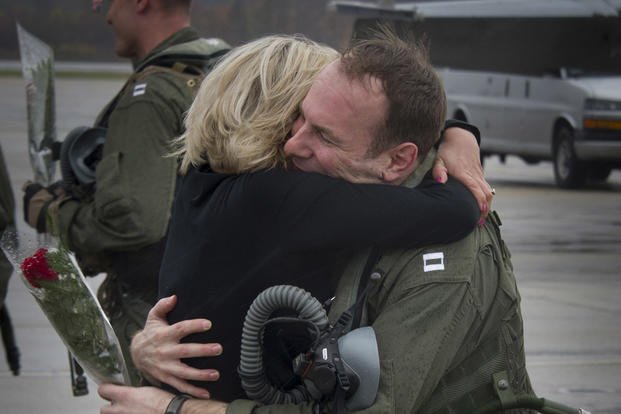As military spouses, we’ve all been told at one point or another, “Absence makes the heart grow fonder,” by a well-meaning friend or family member. And, every time I hear that phrase I want to respond, “Hmm. Try it.”
Instead, with a polite smile and a deep breath, I usually mutter something along the lines of, “Yep. What doesn’t kill you makes you stronger, right?”
My husband and I didn’t live in the same city until we’d been married for six months. Of our 10 years together, nearly half have been spent apart. Long-distance relationships get such a bad reputation, but I’ve met so many great military couples who have made them work. Could it be possible that with back to back deployments, TDYs, training, individual assignments and more training, your relationship can flourish as if you were in the same zip code?
In her study “Absence Makes the Communication Grow Fonder: Geographic Separation, Interpersonal Media, and Intimacy in Dating Relationships,” researcher L. Crystal Jiang found just that.
"Indeed, our culture, emphasizes being together physically and frequent face-to-face contact for close relationships, but long-distance relationships clearly stand against all these values. People don't have to be so pessimistic about long-distance romance," said Jiang. "The long-distance couples try harder than geographically close couples in communicating affection and intimacy, and their efforts do pay back."
Good to know; it’s definitely possible. But how can you make sure your time apart actually brings you closer together?
3 Ways Deployments Can Bring You Closer as a Couple
Use the time to get to know each other again. Whether you’ve been dating a few months or married a few decades, it’s really easy to get into a routine at home that doesn’t fuel your marital fire. How often have you and your spouse sat on the couch in the same room, but both on your phones in separate worlds? When you’re apart, you’re forced to talk to each other in order to stay connected. Use this time to delve deeper into who you are and where you’ve been. Ask questions that you haven’t before.
For prompts, visit the Legacy Project’s childhood and life lessons topics. From “What was your favorite toy as a child?” to “What was the best advice your grandparents gave you?” use the distance to learn more about one another. Looking for more conversation points? Order any one of the Table Topics sets and draw a card a day.
Keep flirting. When your spouse is gone, physical intimacy is obviously complicated. Establishing emotional intimacy, on the other hand, is a critical aspect of keeping your relationship strong.
Kelly Alcorn, a Navy wife and licensed clinical social worker, has worked with many military couples in her Growth practice. “I see plenty of couples that look forward to deployment. They use that time to reconnect,” she says. Kelly explains, “When my husband is home, he is fairly stoic, task-oriented. We have a different kind of connection than when he’s gone. When he’s deployed, I get the intentional, poetic version. I have women tell me, ‘I can’t wait for my spouse to go. We need this time.’ After five deployments, I get it. You can -- and should -- use deployments to grow as a couple.”
Kelly underscores the importance of flirting, and future planning. “Building anticipation is so important. Talk about what you’re going to do when your spouse gets home. ‘I want to do this with you when you get home. When you get back, the first thing we’ll do is…’ Go back to basics. Talk about your love story: where you fell in love, how you fell in love, and how you can recreate that when your spouse returns.”
Keep things fresh. Maybe this is the year you’re going to send boudoir photos. Don’t get many phone calls? Mail an old-school tape recorder back and forth, creating a running dialogue of what you plan to do when your spouse comes home. Write love letters. Remind yourself that missing someone is a true testament to how you really feel about him or her.
Find gratitude. While it’s often easy to fire off an email about the woes of your day, Alcorn suggests you repackage your approach with a light of positivity. “It’s tempting to send a message saying, ‘Oh you missed it. Norovirus swept through here and of course, you were nowhere around.’ It sounds resentful. Instead, try to see the humor in it. I’ll send a poem to my husband that says ‘roses are red, violets are blue, let me tell you about the day I had,’ and we’ll laugh about it. He’ll tell me he’s eaten the worst, rubbery fish on the ship and was thinking about that salmon recipe I have, and it made him miss me. ‘Thanks for dinner, hon,’ and a plate left on the table isn’t nearly as romantic as him being thankful for my cooking when he’s out to sea. Being apart gives you an opportunity to focus on your gratitude for each other.”
Whether your spouse is on the other side of the globe, or the other side of the couch, use these tips to grow together, without growing apart. Make an effort to connect intentionally, keep the romance alive, and find gratitude in not only one another but in your situation as well.
After all, absence makes the heart grow fonder, remember?
Keep Up with the Ins and Outs of Military Life
For the latest military news and tips on military family benefits and more, subscribe to Military.com and have the information you need delivered directly to your inbox.









